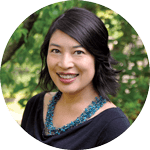- October 28, 2016
- By Liam Farrell
A UMD-led survey of the historically understudied Asian-American population has found that they are increasingly identifying as Democrats.
 Contrary to stereotypes, says Janelle Wong, director of UMD’s Asian American Studies program and a principal investigator for the survey team, Asian-American politics are progressive and extend beyond the economy and education.
Contrary to stereotypes, says Janelle Wong, director of UMD’s Asian American Studies program and a principal investigator for the survey team, Asian-American politics are progressive and extend beyond the economy and education.
“This is a group that shows a lot of support for ‘big government’ programs,” Wong says. “They have a much broader political agenda, and that agenda does work for the Democrats.”
The 2016 National Asian American Survey, published earlier this month, asked more than 2,500 Asian Americans and native Hawaiian and Pacific Islanders for their views on politics and civil engagement. As an indication of the breadth of this audience, the survey was conducted in 10 languages and covers groups ranging from Asian Indian, Chinese and Korean to Hmong and Cambodian Americans. The Asian-American population, estimated at more than 18 million, grew 46 percent between 2000 and 2010—the fastest among minorities.
The survey found 41 percent of Asian Americans identify as Democrats, more than twice the 16 percent identifying as Republicans; that split has grown eight points since the 2008 survey. And although more than 40 percent still identify as nonpartisan, they indicated that they are much more likely to lean Democratic.
Not surprisingly, presidential candidate Hillary Clinton was the choice for 55 percent of respondents compared to 14 percent backing Donald Trump, when the survey was conducted Aug. 10–Sept. 29.
In terms of political policy, the survey shows Asian Americans support several progressive platforms at rates higher than the general U.S. public, such as the Affordable Care Act (60 percent versus 45 percent), increased federal tuition assistance for public colleges (66 percent versus 61 percent) and stricter emissions standards to fight climate change (76 percent versus 64 percent).
A more divided picture emerges on the question of refugees. While 62 percent of Asian Americans oppose an outright ban on Muslim immigration to the United States, only 44 percent support accepting Syrian refugees. Wong says this is a “tragic irony,” considering populations like the Vietnamese have significant refugee histories, but explainable in terms of this year’s heated national security debates and the fact that 12 percent of surveyed Asian Americans listed terrorism as the most important problem facing the U.S.
“I think the rhetoric and discussion about terrorism coming along with refugee communities has really had an effect,” Wong says.
Tags
Research